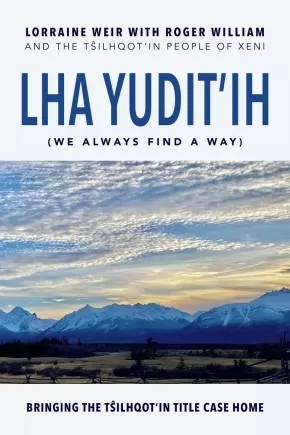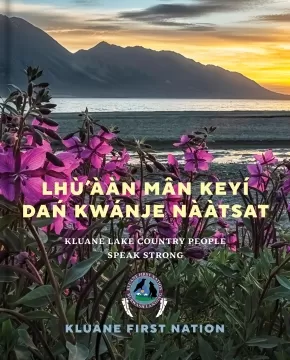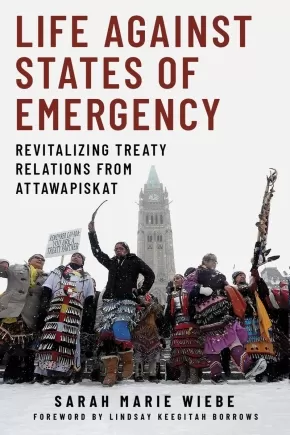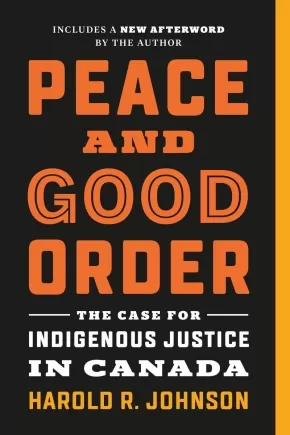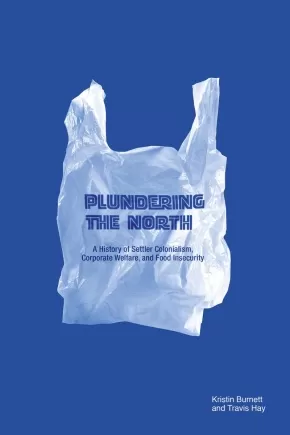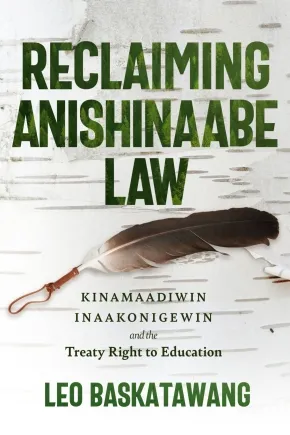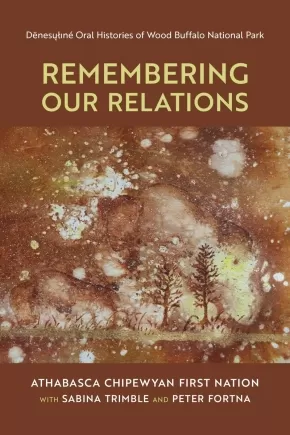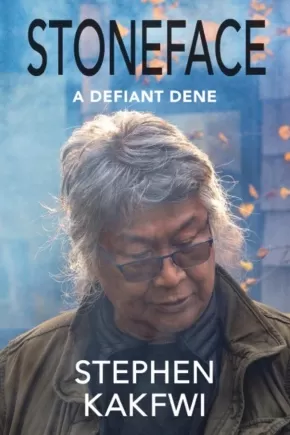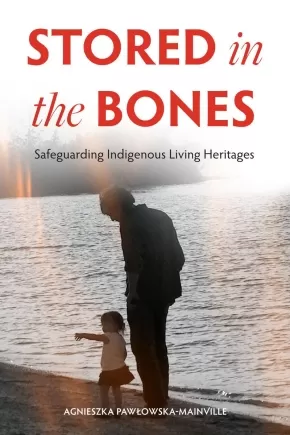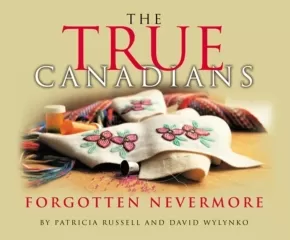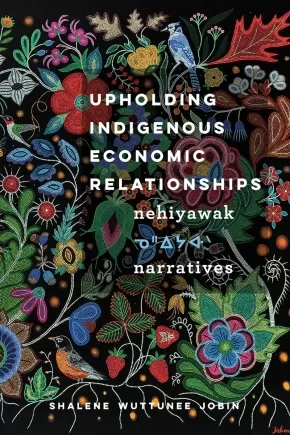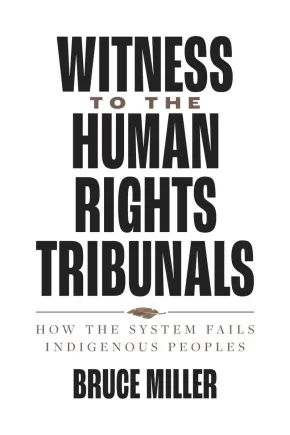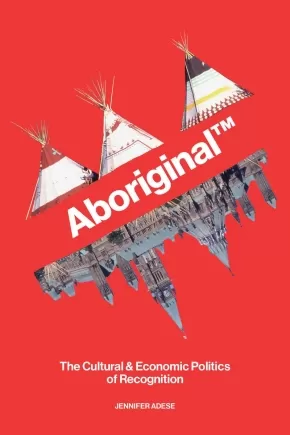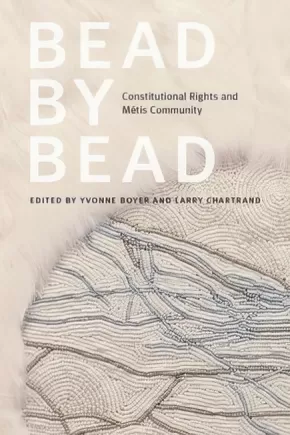Law / Politics
Synopsis:
Eight years in the making, Lha yudit’ih (We Always Find a Way) is a community oral history of Tsilhqot’in Nation v. British Columbia, the first case in Canada to result in a declaration of Aboriginal Rights and Title to a specific piece of land. Told from the perspective of the Plaintiff, Chief Roger William, joined by fifty Xeni Gwet’ins, Tŝilhqot’ins, and allies, this book encompasses ancient stories of creation, modern stories of genocide through smallpox and residential school, and stories of resistance including the Tŝilhqot’in War, direct actions against logging and mining, and the twenty-five-year battle in Canadian courts to win recognition of what Tŝilhqot’ins never gave up and have always known. “We are the land,” as Chief Roger says. After the violence of colonialism, he understands the court case as “bringing our sight back.” This book witnesses the power of that vision, its continuity with the Tŝilhqot’in world before the arrival of colonizers two centuries ago, and its potential for a future of freedom and self-determination for the Tŝilhqot’in People.
Additional Information
480 pages | 6.49" x 9.48" | 32 page colour photograph insert and black and white photos and illustrations and maps throughout | Paperback
Synopsis:
In this poignant display of the resilience of language, culture, and community in the face of the profound changes brought by settlers, Kluane First Nation Elders share stories from their lives, knowledge of their traditional territory (A si Keyi, "my grandfather's country"), and insights on the building of their self-governing First Nation.
With generosity, diligence and deep commitment to their community, Elders from Lhu'aan Man Keyi (Kluane First Nation) recorded oral histories about their lives in the southwest Yukon. They shared wisdom, stories and songs passed down from grandparents, aunties and uncles, in Dan k'e (Southern Tutchone, Kluane dialect) and English. This years-long project arose from the Elders' desire for their children and future generations to know the foundations of language, culture, skills and beliefs that will keep them proud, healthy and strong. The Elders speak of life before the Alaska Highway, when their grandparents drew on thousands of years of traditional knowledge to live on the land through seasonal rounds of hunting and gathering; the dark years after the building of the Alaska Highway, when children were taken away to residential schools and hunting grounds were removed to form the Kluane Game Preserve and National Park; and the decades since, when the community worked through the Yukon land claims process to establish today's self-governing First Nation.
Inclusivity is a key community value. The Elders' stories are accompanied by the voices of youth and citizens of all ages, along with a history of the Kluane region. The book is beautifully illustrated with Elders' photographs, historical images and art work, and photos showing breathtaking views of Kluane mountains, lakes, sites, trails, and activities in the community today. With passionate and deeply informed voices, this is a stirring portrait created by a community that has shown resilience through massive changes and remains dedicated to preserving their culture, language and lands for the generations to come.
Awards
- 2024 Indigenous History Book Prize
Educator Information
Some of the wisdom, stories, and songs are in Dan k'e (Southern Tutchone, Kluane dialect).
Additional Information
384 pages | 11.25" x 9.00"| 150 colour and b&w photos | Hardcover
Synopsis:
For six weeks in 2012–13, Attawapiskat chief Theresa Spence undertook a high-profile ceremonial fast to advocate for improved Canadian-Indigenous relations. Life against States of Emergency responds to the central question she asked the Canadian public to consider: What does it mean to be in a treaty relationship today? This incisive research weaves together community-engaged research, Attawapiskat lived experiences, discourse analysis, ecofeminist and Indigenous studies scholarship, art, activism, and storytelling to advance a transformative, future-oriented approach to treaty relations. By centring community voices, Life against States of Emergency seeks to cultivate democratic dialogue about environmental justice.
Reviews
"Wiebe’s book is rich, thoughtful, and wise. It centres Indigenous realities and theories, allowing readers to understand how the past informs the present, why representation matters, and how to move collectively toward an environmentally just future."— Jocelyn Thorpe, director of the Centre for Creative Writing and Oral Culture at the University of Manitoba
Additional Information
312 pages | 6.00" x 9.00" | 19 b&w photos, 1 map | Paperback
Synopsis:
An urgent, informed, intimate condemnation of the Canadian state and its failure to deliver justice to Indigenous people by national bestselling author and former Crown prosecutor Harold R. Johnson. Now with a brand new foreward.
"The night of the decision in the Gerald Stanley trial for the murder of Colten Boushie, I received a text message from a retired provincial court judge. He was feeling ashamed for his time in a system that was so badly tilted. I too feel this way about my time as both defence counsel and as a Crown prosecutor; that I didn't have the courage to stand up in the courtroom and shout 'Enough is enough.' This book is my act of taking responsibility for what I did, for my actions and inactions." -- Harold R. Johnson
In early 2018, the failures of Canada's justice system were sharply and painfully revealed in the verdicts issued in the deaths of Colten Boushie and Tina Fontaine. The outrage and confusion that followed those verdicts inspired former Crown prosecutor and bestselling author Harold R. Johnson to make the case against Canada for its failure to fulfill its duty under Treaty to effectively deliver justice to Indigenous people, worsening the situation and ensuring long-term damage to Indigenous communities.
In this direct, concise, and essential volume, Harold R. Johnson examines the justice system's failures to deliver "peace and good order" to Indigenous people. He explores the part that he understands himself to have played in that mismanagement, drawing on insights he has gained from the experience; insights into the roots and immediate effects of how the justice system has failed Indigenous people, in all the communities in which they live; and insights into the struggle for peace and good order for Indigenous people now.
Additional Information
272 pages | 5.00" x 7.51" | B&W photo spread in text | Paperback
Synopsis:
The manufacturing of a chronic food crisis.
Food insecurity in the North is one of Canada’s most shameful public health and human rights crises. In Plundering the North, Kristin Burnett and Travis Hay examine the disturbing mechanics behind the origins of this crisis: state and corporate intervention in northern Indigenous foodways.
Despite claims to the contrary by governments, the Hudson’s Bay Company (HBC), and the contemporary North West Company (NWC), the exorbitant cost of food in the North is neither a naturally occurring phenomenon nor the result of free-market forces. Rather, inflated food prices are the direct result of government policies and corporate monopolies. Using food as a lens to track the institutional presence of the Canadian state in the North, Burnett and Hay chart the social, economic, and political changes that have taken place in northern Ontario since the 1950s. They explore the roles of state food policy and the HBC and NWC in setting up, perpetuating, and profiting from food insecurity while undermining Indigenous food sovereignties and self-determination.
Plundering the North provides fresh insight into Canada’s settler colonial project by re-evaluating northern food policy and laying bare the governmental and corporate processes behind the chronic food insecurity experienced by northern Indigenous communities.
Reviews
“Spanning the late nineteenth century to the current day, Plundering the North provides meticulous detail about the ways in which HBC and NWC operated as agents of the state’s settler-colonial ambitions while the state subsidized the processes and profits of those private corporations. This is a valuable, unique, and timely contribution.”— Elaine Power
Additional Information
232 pages | 6.00" x 9.00" | Index, Bibliography | Paperback
Synopsis:
A manifesto for the future of Indigenous Education in Canada
In Reclaiming Anishinaabe Law Leo Baskatawang traces the history of the neglected treaty relationship between the Crown and the Anishinaabe Nation in Treaty #3, and the Canadian government’s egregious failings to administer effective education policy for Indigenous youth—failures epitomized by, but not limited to, the horrors of the residential school system.
Rooted in the belief that Indigenous education should be governed and administered by Indigenous peoples, Baskatawang envisions a hopeful future for Indigenous nations where their traditional laws are formally recognized and affirmed by the governments of Canada. Baskatawang thereby details the efforts being made in Treaty #3 territory to revitalize and codify the Anishinaabe education law, kinamaadiwin inaakonigewin. Kinamaadiwin inaakonigewin considers education wholistically, such that it describes ways of knowing, being, doing, relating, and connecting to the land that are grounded in tradition, while also positioning its learners for success in life, both on and off the reserve.
As the backbone of an Indigenous-led education system, kinamaadiwin inaakonigewin enacts Anishinaabe self-determination, and has the potential to bring about cultural resurgence, language revitalization, and a new era of Crown-Indigenous relations in Canada. Reclaiming Anishinaabe Law challenges policy makers to push beyond apologies and performative politics, and to engage in meaningful reconciliation practices by recognizing and affirming the laws that the Anishinaabeg have always used to govern themselves.
Reviews
"Leo Baskatawang offers a passionate call for Indigenous self-determination and a reclamation of Anishinaabe education law and practice in raising up the next generation. This book can be used to envision a future that uses Indigenous treaties to drive systemic change in education."— Brittany Luby
Additional Information
240 pages | 6.00" x 9.00" | b&w illustrations, maps, index, bibliography | Paperback |
Synopsis:
Elders and leaders remind us that telling and amplifying histories is key for healing. Remembering Our Relations is an ambitious collaborative oral history project that shares the story of Wood Buffalo National Park and the Dënesųłıné peoples it displaced.
Wood Buffalo National Park is located in the heart of Dënesųłıné homelands, where Dené people have lived from time immemorial. Central to the creation, expansion, and management of this park, Canada’s largest at nearly 45, 000 square kilometers, was the eviction of Dënesųłıné people from their home, the forced separation of Dene families, and restriction of their Treaty rights.
Remembering Our Relations tells the history of Wood Buffalo National Park from a Dene perspective and within the context of Treaty 8. Oral history and testimony from Dene Elders, knowledge-holders, leaders, and community members place Dënesųłıné voices first. With supporting archival research, this book demonstrates how the founding, expansion, and management of Wood Buffalo National Park fits into a wider pattern of promises broken by settler colonial governments managing land use throughout the twentieth and twenty-first centuries.
By prioritizing Dënesųłıné histories Remembering Our Relations deliberately challenges how Dene experiences have been erased, and how this erasure has been used to justify violence against Dënesųłıné homelands and people. Amplifying the voices and lives of the past, present, and future, Remembering Our Relations is a crucial step in the journey for healing and justice Dënesųłıné peoples have been pursuing for over a century.
Additional Information
352 pages | 6.00" x 9.00" | Paperback
Synopsis:
Stephen Kakfwi was born in a bush camp on the edge of the Arctic Circle in 1950. In a family torn apart by tuberculosis, alcohol and the traumas endured by generations in residential school, he emerged as a respected Dene elder and eventually the Premier of the Northwest Territories.
Stephen belongs to a cohort of young northerners who survived the childhood abuses of residential school only to find themselves as teenagers in another residential school where one Oblate father saw them as the next generation of leaders, and gave them the skills they would need to succeed. Kakfwi, schooled on civil rights and 1960s protest songs, dedicated himself to supporting chiefs in their claim to land that had been taken away from them and in their determination to seize control of the colonial political system.
Kakfwi’s life has been a series of diverse endeavours, blending traditional Dene practices with the daily demands of political office—hunting moose one day and negotiating with European diamond merchants the next. Throughout his career, Kakfwi understood that he held the power to make change—sometimes he succeeded, sometimes he did not. But he also embraced the power of story-telling, and has helped change the story of the North.
Kakfwi combines his remarkable memory for detail with his compelling raconteur’s skill in taking us through the incredible story of his life and one of the most transformative times in Canadian history. In his candid description of the loneliness of leadership and his embrace of Dene spirituality, Kakfwi’s Stoneface transforms politics into philosophy and an intensely personal guide to reconciliation.
Additional Information
240 pages | 6.00" x 9.00" | Paperback
Synopsis:
A new tool for preserving Indigenous cultural heritages.
Intangible cultural heritage (ICH) refers to community-based practices, knowledges, and customs that are inherited and passed down through generations. While ICH has always existed, a legal framework for its protection only emerged in 2003 with the UNESCO Convention for the Safeguarding of Intangible Cultural Heritage. In Stored in the Bones, Agnieszka Pawłowska-Mainville details her work with Anishinaabeg and Inninuwag harvesters, showcasing their cultural heritage and providing a new discourse for the promotion and transmission of Indigenous knowledge.
The book focuses on lived experiences of the akiwenziyag and kitayatisuk, “men of the land” in Anishinaabemowin/Ojibwe and Inninumowin/Cree, respectively. These men shared their dibaajimowinan and achimowinak (life stories)—from putting down tobacco to tending traplines—with Pawłowska-Mainville during her fifteen years of research in Manitoba and northwestern Ontario. By performing their living heritage, the akiwenziyag and kitayatisuk are, in the words of Richard Morrison, doing what they need to do to “energize and strengthen their bones as they walk this Earth." Illustrating the importance of ICH recognition, Pawłowska- Mainville also explores her experiences with the Manitoba Clean Environment Commission regarding the impacts of hydro development and the Pimachiowin Aki UNESCO World Heritage Site nomination.
Stored in the Bones enriches discussions of treaty rights, land claims, and environmental and cultural policy. Presenting practical ways to safeguard ICH and an international framework meant to advance community interests in dealings with provincial or federal governments, the study offers a pathway for Indigenous peoples to document knowledge that is “stored in the bones.”
Reviews
“Pawłowska-Mainville’s study is a robust contribution to understanding sovereignty as a vital well-spring for action today. More importantly, this text properly contextualizes that sovereignty outside of colonial legal framings, and carefully establishes it within the continuous practice of ‘peoplehood’." — Wendy Russell
“This book contributes to ongoing discussions of Indigenous-settler relations in Canada around reconciliation, UNDRIP, and TRC. The environmental assessment context is intriguing and executed productively.” — Thomas (Tad) McIlwraith
Additional Information
320 pages | 6.00" x 9.00" | index, bibliography | Paperback
Synopsis:
An intriguing look at the connections between Alberta premier Peter Lougheed and his Métis grandmother, Isabella Clarke Hardisty Lougheed, exploring how Métis identity, political activism, and colonial institutional power shaped the lives and legacies of both.
Combining the approaches of political biography and historical narrative, The Premier and His Grandmother introduces readers to two compelling and complex public figures. Born into a prominent fur trading family, Isabella Clarke Hardisty Lougheed (1861–1936) established a distinct role for herself as an influential Métis woman in southern Alberta, at a time when racial boundaries in the province were hardening and Métis activists established a firm foundation for the Métis to be recognized as distinct Indigenous Peoples.
Isabella’s grandson Edgar Peter Lougheed (1928–2021) served as premier of Alberta at a time when some of that activism achieved both successes and losses. Drawing on Peter Lougheed’s personal papers, family interviews, and archival research, this book analyzes his political initiatives in the context of his own identity as a person of Métis ancestry. While there are several publications that refer to Peter Lougheed in the context of his role as premier, few of those publications have acknowledged his connection to an important Métis pioneer family and his connection to his Indigenous ancestors.
Additional Information
320 pages | 6.00" x 9.00" | b&w photographs | Paperback
Synopsis:
For over two centuries, the Métis have fought for recognition as an Indigenous people and as a Nation. This struggle has played out on the battlefield, in the courts, and at the negotiating table, often over issues of governance, land rights, and resources. It wasn’t until 1982, when the government patriated the Constitution, that Métis rights were officially recognized by Canada. The True Canadians chronicles Métis challenges and achievements over those 40 years and well before. Focused on Alberta, the book traces the growth of the Métis Nation of Alberta, which in 2022 ratified its own Constitution, the same year as the 40th anniversary of Canada’s Constitution Act. The title refers to the fact the Métis are the people born of this land.
Additional Information
11.00" x 9.00" | Hardcover
Synopsis:
Upholding Indigenous Economic Relationships explains settler colonialism through the lens of economic exploitation, using Indigenous methodologies and critical approaches. What is the relationship between economic progress in the land now called Canada and the exploitation of Indigenous peoples? And what gifts embedded within Indigenous world views speak to miyo‐pimâtisiwin ᒥᔪ ᐱᒫᑎᓯᐃᐧᐣ (the good life), and specifically to good economic relations?
Shalene Wuttunee Jobin draws on the knowledge systems of the nehiyawak ᓀᐦᐃᔭᐊᐧᐠ (Cree people) – whose distinctive principles and practices shape their economic behaviour – to make two central arguments. The first is that economic exploitation was the initial and most enduring relationship between newcomers and Indigenous peoples. The second is that Indigenous economic relationships are constitutive: connections to the land, water, and other human and nonhuman beings form who we are as individuals and as peoples. This groundbreaking study employs Cree narratives that draw from the past and move into the present to reveal previously overlooked Indigenous economic theories and relationships, and provides contemporary examples of nehiyawak renewing these relationships in resurgent ways. In the process, Upholding Indigenous Economic Relationships offers tools that enable us to reimagine how we can aspire to the good life with all our relations.
This study will interest not only scholars and students of Indigenous studies, particularly Cree studies, but also Indigenous community members involved in community and economic development, planning, and governance.
Reviews
"Beautifully written, Upholding Indigenous Economic Relationships is crucially important as a comprehensive exploration of Cree economic values told through story and oral history." -
"Shalene Jobin’s refreshing perspective on a prairie First Nations community is a desperately needed contribution to Indigenous studies as well as history, anthropology, and Canadian studies." -
Educator Information
Table of Contents
Preface
1 Grounding Methods
2 Grounding Economic Relationships
3 nehiyawak Peoplehood and Relationality
4 Canada’s Genesis Story
5 ᐃᐧᐦᑎᑯᐤ Warnings of Insatiable Greed
6 Indigenous Women’s Lands and Bodies
7 Theorizing Cree Economic and Governing Relationships
8 Colonial Dissonance
9 Principles Guiding Cree Economic Relationships
10 Renewed Relationships through Resurgent Practices
11 Upholding Relations
Postscript
Glossary of Cree Terms
Notes; References; Index
Additional Information
272 pages | 6 x 9" | Paperback
Synopsis:
What happens behind the scenes at a Canadian human rights tribunal? And why aren’t human rights tribunal processes working for Indigenous people?
Witness to the Human Rights Tribunals opens the doors to the tribunal, revealing the interactions of lawyers, tribunal members, expert witnesses, and Indigenous litigants. Bruce Miller provides an in-depth look at the role of anthropological expertise in the courts, and draws on testimony, ethnographic data, and years of tribunal decisions to show how specific cases are fought and how expert testimony about racialization and discrimination is disregarded. His candid analysis reveals the double-edged nature of the tribunal itself, which re-engages with the trauma and violence of discrimination that suffuses social and legal systems while it attempts to protect human rights.
Grounded in expert experience, this important book asks hard questions. Should human rights tribunals be replaced, or paired with an Indigenous-centred system? How can anthropologists support an understanding of the pervasive discrimination that Indigenous people face? It definitively concludes that any reform must consider the problem of symbolic trauma before Indigenous claimants can receive appropriate justice.
An international audience of scholars and students of law, anthropology, the anthropology of law, human rights, and alternative justice will find this comprehensive work invaluable. Advocates, lawyers, and other professionals involved in human rights tribunals and extra-court proceedings will also find it an important addition to their libraries.
Additional Information
240 pages | 6.00" x 9.00"| 8 tables | Paperback
Synopsis:
In Aboriginal™, Jennifer Adese explores the origins, meaning, and usage of the term “Aboriginal” and its displacement by the word “Indigenous.” In the Constitution Act, 1982, the term’s express purpose was to speak to specific “aboriginal rights”. Yet in the wake of the Constitution’s passage, Aboriginal, in its capitalized form, became increasingly used to describe and categorize people.
More than simple legal and political vernacular, the term Aboriginal (capitalized or not) has had real-world consequences for the people it defined. Aboriginal™ argues the term was a tool used to advance Canada’s cultural and economic assimilatory agenda throughout the 1980s until the mid-2010s. Moreover, Adese illuminates how the word engenders a kind of “Aboriginalized multicultural” brand easily reduced to and exported as a nation brand, economic brand, and place brand—at odds with the diversity and complexity of Indigenous peoples and communities.
In her multi-disciplinary research, Adese examines the discursive spaces and concrete sites where Aboriginality features prominently: the Constitution Act, 1982; the 2010 Vancouver Olympics; the “Aboriginal tourism industry”; and the Vancouver International Airport. Reflecting on the term’s abrupt exit from public discourse and the recent turn toward Indigenous, Indigeneity, and Indigenization, Aboriginal™ offers insight into Indigenous-Canada relations, reconciliation efforts, and current discussions of Indigenous identity, authenticity, and agency.
Additional Information
272 pages | 6.00" x 9.00" | Paperback
Synopsis:
What does the phrase Métis peoples mean in constitutional terms? As lawyers and scholars dispute forms of Métis identity, and debate the nature and scope of Métis rights under the Canadian Constitution, understanding Métis experience of colonization is fundamental to achieving reconciliation.
In Bead by Bead, contributors address the historical denial – at both federal and provincial levels – of outstanding Métis concerns and Aboriginal rights claims, in particular with respect to land, resources, and governance. Tackling such themes as ongoing colonial policies, the invisibility of Métis women in court decisions, identity politics, and racist legal principles, they uncover the troubling issues that plague Métis aspirations for a just future.
This nuanced analysis of the parameters that current Indigenous legal doctrines place around Métis rights discourse moves beyond a one-size-fits-all definition of Métis or a uniform approach to Aboriginal rights. By raising critical questions about self-determination, colonization, kinship, land, and other essential aspects of Métis lived reality, these clear-eyed essays go beyond legal theorizing and create pathways to respectful, inclusive Métis-Canadian constitutional relationships.
This book is essential reading for scholars and students of Métis and Indigenous studies and Aboriginal law, as well as for lawyers, politicians, and civil servants engaged in Métis issues.
Contributors: Brodie Douglas, Karen Drake, Christopher Gall, Adam Gaudry, Sébastien Grammond, Brenda L. Gunn, Thomas Isaac, Wanda McCaslin , Darren O’Toole, Jeremy Patzer, Signa A. Daum Shanks, D’Arcy Vermette.
Reviews
“Finally, we have a source that in a single place provides material and commentary that will support informed debate and help to come to grips with the questions of Métis identity, community, and constitutional rights. . . . This book accurately addresses who we are: as a people with common values, traditions, culture, way of life, family ties, history, communities and shared territory. . . . There is no question of its value, the knowledge we gain from it and how it will augment everyone’s perspective of the issues of Métis.”—Tony Belcourt, OC, first president of the Native Council of Canada and founding president of the Métis Nation of Ontario
Educator Information
Table of Contents
Foreword / Tony Belcourt
Introduction / Yvonne Boyer, Larry Chartrand, and Wanda McCaslin
1 Métis Identity Captured by Law: Struggles over Use of the Category Métis in Canadian Law / Sébastien Grammond
2 Recognition and Reconciliation: Recent Developments in Métis Rights Law / Thomas Isaac
3 Shifting the Status Quo: The Duty to Consult and the Métis of British Columbia / Christopher Gall and Brodie Douglas
4 The Resilience of Métis Title: Rejecting Assumptions of Extinguishment / Adam Gaudry and Karen Drake
5 Where Are the Women? Analyzing the Three Métis Supreme Court of Canada Decisions / Brenda L. Gunn
6 Manitoba Metis Federation and Daniels: "Post-Legal" Reconciliation and Western Métis / Jeremy Patzer
7 Colonial Ideologies: The Denial of Métis Political Identity in Canadian Law / D’Arcy Vermette
8 Métis Aboriginal Rights: Four Legal Doctrines / Darren O’Toole
9 Suzerainty, Sovereignty, Jurisdiction: The Future of Métis Ways / Signa A. Daum Shanks
Afterword / Yvonne Boyer and Larry Chartrand
Index
Additional Information
236 pages | 6.00" x 9.00" | Paperback

